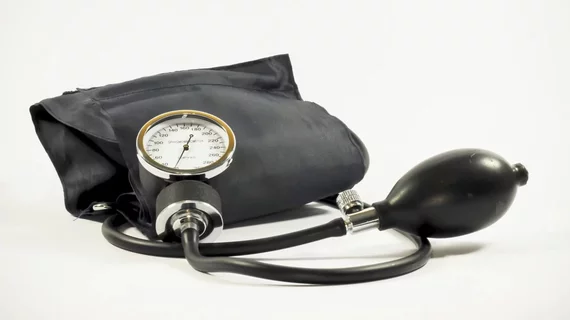A big update: COVID-19 patients with hypotension may need to stop taking blood pressure medications
COVID-19 patients may need to stop taking angiotensin-converting enzyme (ACE) inhibitors and angiotensin receptor blockers (ARBs) if they develop hypotension, according to new findings presented during the American Heart Association’s Hypertension 2020 Scientific Sessions.
“Our study suggests low blood pressure in a person with a history of high blood pressure is an important and independent signal that someone with COVID-19 is developing or has acute kidney injury,” study author Paolo Manunta, MD, PhD, chair of nephrology at San Raffaele University in Milan, Italy, said in a prepared statement. “This also suggests that people with high blood pressure should carefully monitor it at home, and their kidney function should be measured when they’re first diagnosed with COVID-19. If they or their doctors notice blood pressure levels going down to the hypotensive range, their doctors may consider reducing or stopping their blood pressure medications to prevent kidney damage and possibly even death.”
A bit of context
The role of ACE inhibitors and ARBs in the treatment of COVID-19 has been a key topic for researchers since the pandemic began. While there was an initial push from some parties for patients to stop taking antihypertensive medications if they were diagnosed with COVID-19, cardiovascular specialists pushed back, emphasizing their continued importance.
For example, the AHA, Heart Failure Society of America, and American College of Cardiology released a joint statement in March that highlighted why patients should remain on ACE inhibitors and ARBs.
“We understand the concern—as it has become clear that people with cardiovascular disease are at much higher risk of serious complications including death from COVID-19,” Robert A. Harrington, MD, AHA president and Arthur L. Bloomfield Professor of Medicine at Stanford University, said at the time. “However, we have reviewed the latest research—the evidence does not confirm the need to discontinue ACE-i or ARBs, and we strongly recommend all physicians to consider the individual needs of each patient before making any changes to ACE-i or ARB treatment regimens.”
Additional studies have been published that highlighted how ACE inhibitors and ARBs can help COVID-19 patients. A meta-analysis published in Current Atherosclerosis Reports, for instance, explored data from 19 different studies and concluded that antihypertensive medications can improve COVID-19 survival rates and reduce a person’s likelihood of severe illness.
The latest
These latest findings from Manunta et al., however, provide an example of why researchers never stop exploring data and asking important questions. The group examined nearly 400 COVID-19 patients hospitalized in March and April 2020 at a single facility in Italy. Overall, they found that more than 60% of hospitalized COVID-19 patients had a history of hypertension—and most of those patients were taking antihypertensive medications daily.
The team’s key finding was that a patient’s likelihood of in-hospital death was doubled if they had mild hypotension when they arrived to the emergency department. Also, patients presenting with severe hypotension were nine times more likely to have acute kidney injury, and patients with “mild” hypotension were four times more likely to have acute kidney injury.
“We continue to monitor and review the latest research, and we strongly recommend all physicians to consider the individual needs of each patient before making any changes to ACE-i or ARB treatment regimens,” Mariell Jessup, MD, chief science and medical officer of the AHA, said in the statement. “The latest research findings do suggest, however, that these medications should be discontinued in patients who develop hypotension in order to avoid severe kidney damage.”

